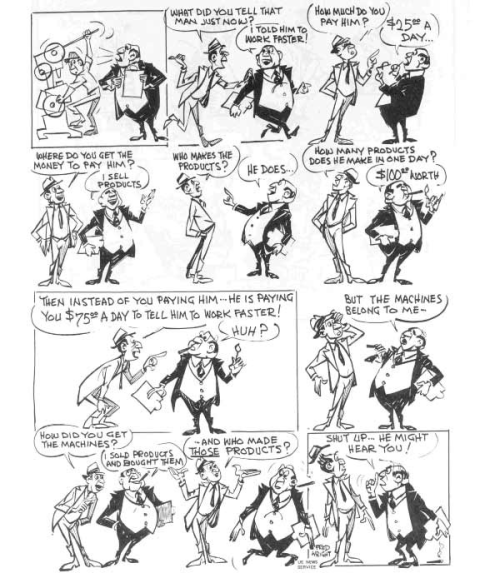Is capitalism inherently coercive?

Yes.
Side Score: 10
|
 |
No.
Side Score: 6
|
|
|
|
|
2
points
|
I agree with Bohemian on this, but I would have to say no in that saying "capitalism is inherently coercive" is basically limiting what can be coercive. Living is coercive. When standards are set and morals are created, society is coercing you. I ask... what about Capitalism enforces moral or ethical standards? Basically, the only standard they have is "respect life and property" (of course, the standards of free market capitalists and not these neo-socialist capitalist hybrids we have today). You are coerced into not depriving someone else of their life and property... so sure, there is a level of coercion. But I see Socialism or even a Mixed Economy to be far more coercive than that. Because now anything you want or need is determined by a higher entity (God or Government) and not by what you feel should belong to you. Sure, the working man has no choice but to work, but how is that different from ANYTHING at all? No matter what system of economics, you have to work. The only way you don't have to work is if you win the lottery, or force others to work for you (or just commit suicide). But Socialism will not save the working man. he will continue to work and will continue to get only what he needs (and there will be far less material/commercial goods at this point). Capitalism, on the other hand, creates incentive, provides limited opportunity. You COULD become a rich man, or you could not, but under Socialism, you only benefit if you're in government (goody). Side: No.
I think that defining the terms "capitalism," "inherently" and "coercion" is necessary for this debate. Going from dictionary.reference.com: Capitalism "an economic system in which investment in and ownership of the means of production, distribution, and exchange of wealth is made and maintained chiefly by private individuals or corporations, especially as contrasted to cooperatively or state-owned means of wealth." Inherently "existing in someone or something as a permanent and inseparable element, quality, or attribute: an inherent distrust of strangers." Coercion "the act of coercing; use of force or intimidation to obtain compliance." Going by these definitions, to conclude that capitalism is inherently coercive you must prove that use of force or intimidation to obtain compliance is a permanent element in capitalism. Offering competing wages, conditions and benefits is how to gain workers and compliance in a capitalist society. Workers provide the value of their labour for a wage they voluntarily agree to work for. This cannot be coercion unless they are physically forced or intimidated with the threat of force to work for a wage. To equate capitalism with coercion, would be to argue that if someone is thirsty and has no water- and someone else has water they are willing to sell- that it is coercion to sell it at whatever price the thirsty customer is willing to pay for it. As long as no physical threat or means are used to force someone to buy your water or go search for water elsewhere, then by definition this cannot be coercive. Side: No.
1
point
"This cannot be coercion unless they are physically forced or intimidated with the threat of force to work for a wage." I'm sorry but I just don't agree with this. Your definition of coercion is limited, psychological coercion is also a form of coercion, and it is manifest in governments that use methods of coercive persuasion (more commonly referred to as brainwashing), which all of them do to some degree. Side: Yes.
If you have a problem with the definition from dictionary.reference.com, feel free to provide your own. Everywhere I looked the definition for coercion by itself is along the lines of "physical force or the threat of physical force". If you want to argue that capitalism is inherently "psychologically coercive" then you will have to provide a definition for that. We do not disagree if you accept the definition of coercion as physical force or the threat of physical force. I did see the section on wikipedia for psychological coercion, but as you brought up it describes various acts of government throughout history. This is not a debate about government. Coercion must at the very least imply the threat of physical force. I don't see how that could be inherent in capitalism. Who is the victim of capitalism? How are they being coerced, and to do what? Side: No.
|


